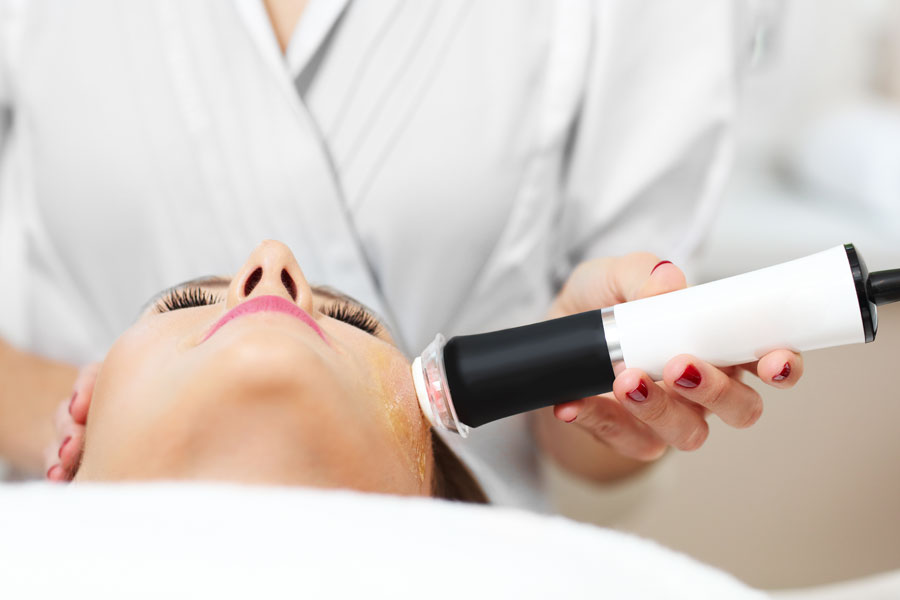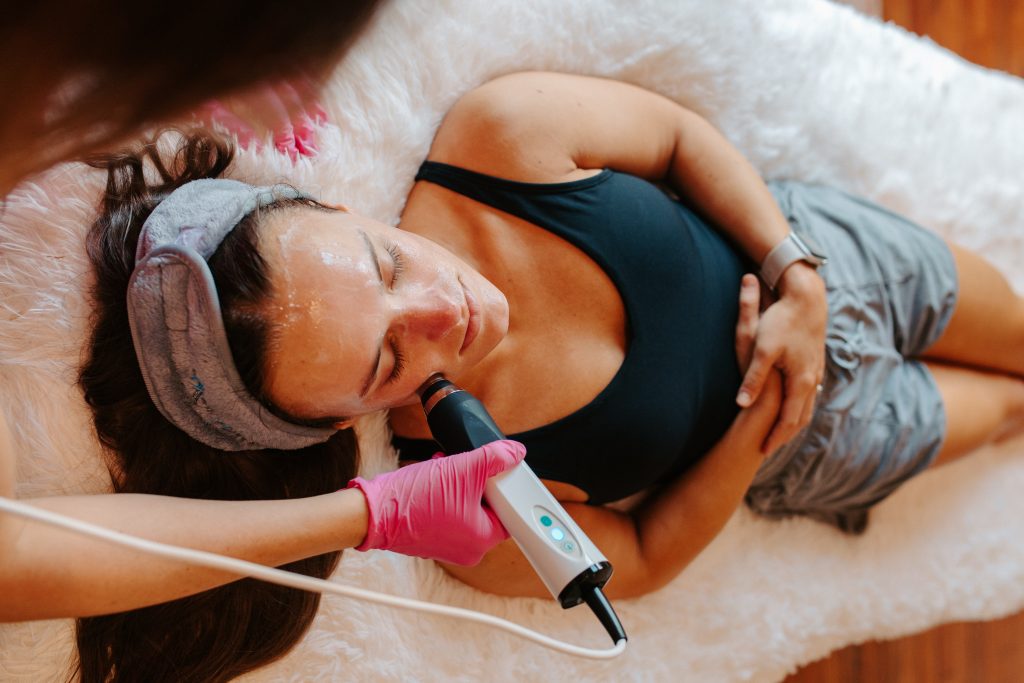How To Treat Acne With Sensitive Skin
Written by: Erin Sevigny
Having sensitive skin can make treating acne a challenging task. At Franklin Skin Studio, we understand the unique needs of individuals with sensitive skin and specialize in providing gentle and effective solutions for acne treatment. In this blog post, we will explore the intricacies of treating acne with sensitive skin, provide insight into how to stop acne on the forehead and provide expert advice to help you achieve clear, healthy skin.
Understanding Acne and Sensitive Skin
Acne is a common skin condition that affects people of all ages. Still, individuals with sensitive skin face additional challenges when it comes to managing and treating acne. Sensitive skin tends to be more reactive and prone to irritation, so adopting a customized approach that balances acne treatment and sensitivity management is crucial.
The Importance of Gentle Skincare for Sensitive Skin
Do you want to know how to prevent acne on the forehead, chin, nose, or neck? It starts with choosing cleansers specifically formulated for sensitive skin. Look for mild, fragrance-free cleansers that do not strip the skin’s natural moisture barrier. Avoid harsh ingredients like sulfates and alcohol, as they can further irritate the skin.
Delicate Cleansing: Choosing the Right Cleansers for Sensitive Acne-Prone Skin
Gentle cleansing is the foundation of any skincare routine for sensitive acne-prone skin. Opt for non-comedogenic cleansers that effectively remove dirt, excess oil, and impurities without causing irritation or clogging the pores. Avoid scrubbing or using abrasive exfoliants, as they can exacerbate sensitivity and inflammation. Instead, use mild chemical exfoliants with ingredients like salicylic or lactic acid to gently exfoliate and unclog pores.
Nurishing the Sensitivity: Effective Moisturization for Sensitive Acne-Prone Skin
Proper hydration and moisturization play a vital role in managing sensitive acne-prone skin. Look for lightweight, non-comedogenic moisturizers that provide hydration without clogging pores. Ingredients like hyaluronic acid and ceramides can help maintain the skin’s moisture balance and strengthen its natural barrier function. Be sure to apply moisturizer to lock in moisture while the skin is still slightly damp.
Shielding Your Skin: Sun Protection Tips for Sensitive Skin with Acne
Protecting your skin from harmful UV rays is crucial, especially when dealing with acne. Sensitive skin is often more susceptible to sunburn and hyperpigmentation. Choose a broad-spectrum sunscreen with an SPF of 30 or higher that is specifically formulated for sensitive skin. Look for physical sunscreens containing ingredients like zinc oxide or titanium dioxide, which tend to be less irritating than chemical sunscreens.
How to Treat Acne with Sensitive Skin: Targeted Treatments for Specific Areas
Battling Forehead Acne: How to Get Acne Off Your Forehead
Acne can manifest in different areas of the face, requiring targeted treatment approaches. For forehead acne, avoid using heavy hair products that can clog pores. Keep your forehead clean and opt for gentle exfoliation to remove dead skin cells. Incorporate acne-fighting ingredients like benzoyl peroxide or tea tree oil in your skincare routine to help reduce inflammation and control breakouts. Avoid touching your face to prevent acne on the forehead, as it can transfer dirt and bacteria to the skin.
Taming Nose Acne: Gentle Approaches to Clearing Acne on the Tip of Nose
Nose acne, including acne on the tip of the nose, can be particularly stubborn and challenging to treat. Gently cleanse the area and avoid harsh squeezing or picking, as it can lead to further irritation and potential scarring. Consider using topical treatments with ingredients like retinoids or niacinamide to help unclog pores and reduce oil production.
How to Prevent Neck Acne: Strategies for Managing and Treating Acne on the Neck
Acne on the neck can be bothersome and often goes unnoticed. Pay attention to keeping the neck area clean and dry. Avoid wearing tight collars or accessories that can trap sweat and bacteria. Incorporate gentle exfoliation and targeted acne treatments into your skincare routine to address neck acne effectively.
Choosing Suitable Products for Sensitive Acne-Prone Skin
When reviewing how to treat acne with sensitive skin, it’s essential to prioritize gentle formulations. Look for products that are labeled as non-comedogenic, fragrance-free, and specifically designed for sensitive skin. Consider ingredients like salicylic acid, benzoyl peroxide, or sulfur, which can help combat acne without causing excessive dryness or irritation. Avoid using acne removal tools at home, as they can lead to further skin damage and inflammation.
Proactive Prevention: Tips to Minimize Breakouts
Preventing breakouts is key to managing acne with sensitive skin. Maintain a consistent skincare routine, cleanse gently twice a day, and avoid touching or picking at your acne. Be cautious when trying new products and introduce them gradually to monitor any adverse reactions. Consider lifestyle factors like stress management, proper nutrition, and adequate sleep to support overall skin health. Remember, touching your face causes acne by transferring dirt and bacteria, so resist the urge to touch or pick at your skin.
Fading Away: Reducing Scarring and Hyperpigmentation in Sensitive Acne-Prone Skin
Acne scars and hyperpigmentation can be distressing, but there are treatments available to help minimize their appearance. Consider professional treatments like chemical peels, microdermabrasion, or laser therapy under the guidance of a skincare expert. Incorporate skincare products with ingredients like vitamin C, retinoids, or niacinamide to help fade acne scars and even out skin tone.
Beyond Skincare: Lifestyle Factors and Additional Considerations
In addition to skincare, several lifestyle factors can impact acne and sensitive skin. Manage stress levels through relaxation techniques like meditation or exercise. Maintain a balanced diet rich in fruits, vegetables, and lean proteins. Avoid triggers like excessive sun exposure, smoking, and high-sugar or processed foods that aggravate acne and skin sensitivity.
In addition, pay attention to the temperature of the water you use on your skin. For instance, you might wonder, “Is cold water good for acne?” While cold water may provide temporary relief and help reduce inflammation, it is not a substitute for a comprehensive acne treatment plan.
The No-Touch Zone: Breaking the Habit of Picking Acne on Sensitive Skin
Picking at acne can worsen inflammation, cause scarring, and prolong the healing process. It’s essential to break the habit of touching or squeezing your acne. That’s why it’s essential to know how to stop picking acne. Follow these tips to avoid contact:
- Keep Your Hands Occupied: Idle hands can often lead to unconsciously touching or picking at your acne. Find alternative activities to keep your hands busy, such as doodling, knitting, or playing with a stress ball. Engaging your hands in other tasks can redirect your attention away from your skin.
- Use Fidget Toys or Stress Balls: Consider using fidget toys or stress balls to occupy your hands and provide a tactile sensation. These tools can help release nervous energy and provide a healthier alternative to picking at your acne.
- Apply Topical Treatments: Use topical treatments that soothe acne and reduce inflammation. Look for products containing ingredients like tea tree oil, aloe vera, or witch hazel. These can help alleviate itching or discomfort associated with acne, reducing the urge to pick.
- Cover Up Your Acne: If you find it challenging to resist the temptation to pick at your acne, consider covering the affected areas with a non-comedogenic concealer or spot treatment. By physically blocking access to the acne, you may be less likely to touch or pick at it.
- Use Bandages or Hydrocolloid Patches: Applying bandages or hydrocolloid patches to individual pimples can create a physical barrier that prevents you from picking. These dressings can also help absorb excess sebum and promote faster healing
- Trim Your Nails: Shorter nails make it more difficult to pick at acne and reduce the potential for skin damage. Keep your nails neatly trimmed to minimize the damage caused by picking.
- Seek Professional Help: If you find it challenging to stop picking at your acne despite your best efforts, consider seeking professional help. Dermatologists or therapists experienced in skin-related behaviors can provide guidance and support tailored to your specific needs.
Remember, breaking the habit of picking at acne takes time and effort. Be patient with yourself and celebrate small victories along the way. By implementing these strategies and seeking support, you can overcome the urge to pick and promote the healing process of your skin.
Personalized Solutions: How Franklin Skin Studio Can Help You Treat Acne with Sensitivity
At Franklin Skin Studio, we understand the complexities of treating acne with sensitive skin. Our team of skincare experts is experienced in providing personalized solutions tailored to your unique needs. Through in-depth consultations, we assess your skin condition and develop customized treatment plans that address acne while considering your skin’s sensitivity. Our expertise and range of advanced treatments aim to help you achieve clear, healthy skin with confidence.
Treating acne on sensitive skin is possible with the right approach and personalized care. Say goodbye to acne and embrace healthier, happier skin with Franklin Skin Studio. Book your appointment for a facial in Franklin, TN, today!


